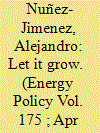| Srl | Item |
| 1 |
ID:
171522


|
|
|
|
|
| Summary/Abstract |
This paper investigates the effect of two different community solar remuneration models on the overall willingness to buy of Swiss electricity customers (n = 496). Based on practical observation, the two main remuneration models that dominate today's implementation landscape for community solar were identified. The first of the former delivers solar power directly from community solar plants, while the second delivers financial compensation instead of solar power. A between-subject-design experiment applying pro-environmental behavior as approximation for intrinsic motivation demonstrated that remuneration schemes which avoid mentioning financial benefits and instead compensate customers with the solar power are particularly attractive to green electricity customers who have higher intrinsic motivation to consume pro-environmental electricity. Offering financial benefits may even discourage these customers from participating in community solar. On the other hand, offering financial benefits appeals to default electricity customers whose intrinsic motivation for pro-environmental behavior is too weak to trigger a reaction to the ecological and local benefits of community solar alone. When designing policies around community solar or implementing community solar projects, policy makers and practitioners should thus carefully analyze the customer base and its composition in order to match remuneration schemes to customer preferences.
|
|
|
|
|
|
|
|
|
|
|
|
|
|
|
|
| 2 |
ID:
191279


|
|
|
|
|
| Summary/Abstract |
Decarbonizing urban energy consumption is critical for addressing climate change, yet renewable power installations in cities are rare due to limited space and economic unattractiveness. Community solar, where multiple electricity users share the electricity generated by their rooftop PV systems, could help overcome these barriers and accelerate PV adoption in cities. Using an agent-based model, we simulated the decision-making of nearly 5000 building owners in a city district in Zurich, Switzerland, and assessed three locally relevant policy scenarios: no community solar, community solar with adjacent buildings, and community solar with buildings within a 100-meter radius. The results show that allowing community solar with adjacent buildings increases the installed PV capacity in 2035 by 1%, as greater economies of scale and higher self-consumption make PV adoption more economically attractive. A more permissive policy, allowing community solar with buildings within a 100-meter radius, provides more opportunities to communities to grow over time and results in 21% more PV installed capacity in 2035 than without community solar. These findings demonstrate the potential of community solar to accelerate PV adoption in cities and underscore the significant role of policy design in achieving this goal.
|
|
|
|
|
|
|
|
|
|
|
|
|
|
|
|
| 3 |
ID:
180170


|
|
|
|
|
| Summary/Abstract |
Effectiveness of renewable energy feed-in tariff (FiT) varies across the world. Designing policy mixes of a package of policy instruments to optimise the normative effect of FiT is critical but has remained challenging and under-studied. This paper brings together the key concepts of policy mixes and policy learning to examine how the effectiveness of renewable energy policies can be improved, with reference to a recent FiT policy in Hong Kong focusing two prospective solar communities. Based on 99 in-depth interviews and workshop discussions involving 57 householders, we found that FiT was an effective policy in stimulating growth of new solar photovoltaic (PV) projects in some sub-sectors in Hong Kong, but has not yet mainstreamed solar at the community and city levels. The FiT was insufficient to address multiple non-economic barriers perceived by householders. The limited policy impacts of the FiT indicated that policy makers were able to attain technical learning, but faced major constraints in advancing to conceptual and social forms of policy learning. This paper concludes that policy makers should give closer attention to policy mixes and advanced forms of policy learning than choosing a single “most effective” policy instrument to unlock the under-used community solar potentials.
|
|
|
|
|
|
|
|
|
|
|
|
|
|
|
|